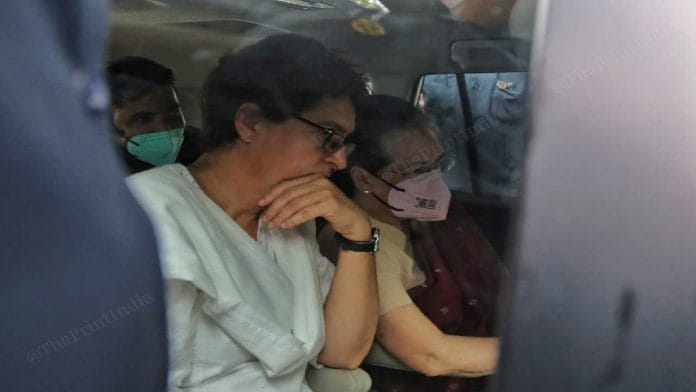The Supreme Court’s decision upholding the procedures followed by the government viv a vis Enforcement Directorate cases under the Prevention of Money Laundering Act appears to have come at a very wrong time for the Congress which is at the receiving end of the law. The three-judge bench ruling was delivered by Justice A. M. Khanvilkar barely 48 hours before his retirement. The Supreme Court’s observations can be interpreted as being supportive of the actions of the present government as far as summoning, arresting and attaching the properties and freezing of bank accounts of several political personalities and business magnets is concerned. The Congress party’s morale is surely at the lowest ebb as the immediate fallout of these observations are on the “first family” facing the wrath of the ED.
The Supreme Court was considering the procedure followed by the Enforcement Directorate (ED) in registering the Enforcement Case Information Report (ECIR), similar to the First Information Report (FIR) in a police station. The contention of the petitioners, including a former Congress leader who now enjoys the support of the Samajwadi Party, that the procedure is opaque, arbitrary and violative of the constitutional rights of the accused was dismissed by the top court. The petitioners had argued that the PMLA, in practice, and the way its provisions are implemented tantamount to breach of basic tenets of the criminal justice system and are draconian. But the court refused to comment on the procedures, saying they are part of the investigation agency’s internal work-related procedures, which need not be made public.
The Supreme Court, while consolidating more than 240 petitions, has upheld that the strict bail provisions under PMLA and the non-disclosure of the grounds of arrest at the time of detention are valid provisions. It is significant to note that the top court has observed that it is not necessary to give ECIR copy to the accused and found nothing wrong in ED’s powers to summon and arrest anyone under the PMLA.
Also read: Summoning Sonia Gandhi to ED will raise public sympathy. BJP knows it, wants it
What’s coming for Congress and others
The immediate fallout of the Supreme Court order will be the fast-tracking of some of the stalled cases involving senior Congress leaders, close aides of former chief minister of J&K Mehbooba Mufti and some businessmen. Since the court has upheld the arrest and seizure of properties, it is likely that the ED will rush to resume these actionable provisions. This will surely result in arrests of some accused, including a former finance minister and his son, against whom the agency has filed chargesheets in the infamous 2G spectrum allocation scandal and the INX Media case.
The Congress’ claim that the Supreme Court’s order gives sweeping powers to the ED under the present BJP-led NDA government hurts the party’s own image as some of these provisions were amended during the UPA government. In what can be interpreted as an insult to the judiciary, the very custodian of fundamental rights, the party has criticised the top court, accusing it of “stripping the citizens of fundamental rights”. Ironically, the Congress has compared the present order to that of the 1976 judgment by a Constitution bench of Supreme Court during the infamous Emergency. The 1976 judgment states that no person has any locus standi to move any habeas corpus petition before a high court. The Congress party’s illogical stand will give a handle to the ruling party to expose the intellectual bankruptcy of the former’s leadership, which seem to be over enthusiastic in protecting the ‘family’ from the long arm of law. The fact that the Supreme Court was hearing more than 240 petitions for nearly two years, all wanting to stall the legal procedures of the ED, belies the rant of the Congress that ‘fundamental rights in danger’.
By claiming that the ED cases against the corrupt have gone up since 2014, the Congress is actually issuing a certificate of merit to the BJP in its commitment to prevent money laundering and punish corrupt elements. Going by the fact that the actions of the Union government have led to 3,010 searches and attachments of crime-funded assets and cash worth nearly Rs one lakh crore should be appreciated. By criticising all prosecution cases as vendetta, the Congress is not only owning these individuals as being connected to it but also shooting at its own foot.
Faced with increasing cases of nexus between money laundering and organised crime such as illegal arms sale, drug & human trafficking and terror funding, the G7 established the Financial Action Task Force (FATF) which recommended measures for governments to enact effective anti-money laundering legislation. The PMLA is part of a global action against organised trans-national crimes that are illegal, immoral and weaken democracy.
Also read: India’s founders kept repressive laws in the book. Today’s politicians show how wrong it was
Advice for Congress
Instead of trying to bail out the corrupt leaders and rushing to white-wash their crimes, the few conscientious ones in the Congress should distance themselves from these elements, including the ‘family’ and its faithful former home and finance minister. By cleansing the party of these corrupt elements, the Congress can go to the people in a new avatar and redeem its image. But it is very unlikely that the group of 23 or any other club within the party will muster enough courage to stand up against the corrupt leadership and give a new purpose and lease of life to the party. Meanwhile, the ED will continue to hunt down the criminals and economic offenders with renewed vigour after the Supreme Court order.
Seshadri Chari is the former editor of ‘Organiser’. Views are personal.
(Edited by Anurag Chaubey)






